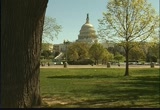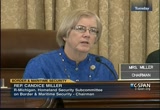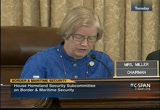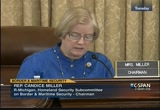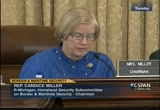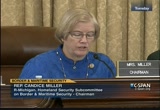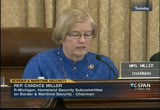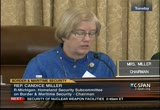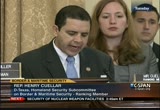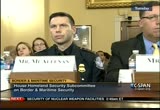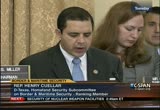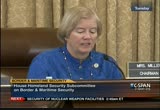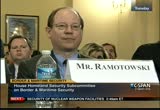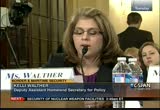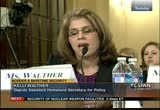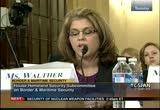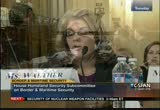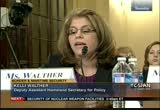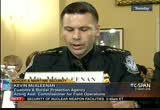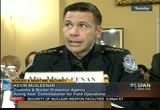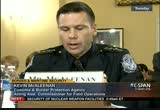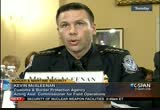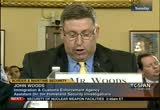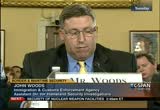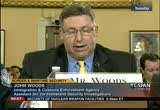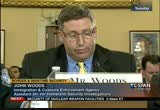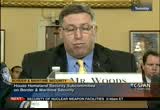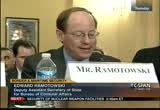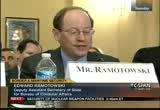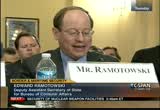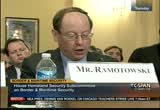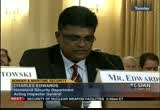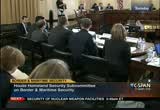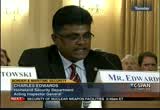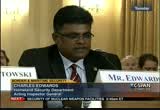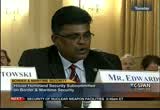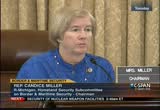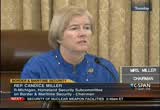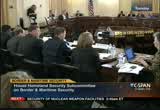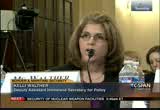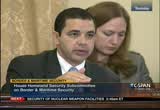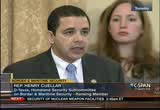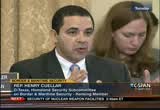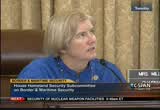tv U.S. Border Security CSPAN September 16, 2012 2:00am-2:45am EDT
2:00 am
waste less energy. put them back to work. >> i will take advantage of our oil, our coal, our gas, our renewables. if america will become energy independent within eight years. >> watch and engage with c-span as the presidential campaigns move toward the october debates. foreign policy will be the focus of the final debate on the 22nd. watched the vice presidential candidates debate on thursday the 11th. follow our coverage on c-span, c-span radio, and online at c- span.org. >> on the 11th anniversary of the 9/11 attacks, the house homeland security subcommittee
2:01 am
on border and maritime security held a hearing on the progress being made in visa security. charles edwards expressed concern over technological issues and challenges in inter- agency coordination. this is 45 minutes. >> good morning, everyone. the committee on border and maritime security will come to order. the subcommittee is meeting today to examine the department of homeland security is ability to prevent terrorists from traveling to the united states. we have an excellent panel of witnesses. i would remind the panelists and the committee that in
2:02 am
remembrance of this day, 9/11, 11 years ago, we have some pictures on the back of this room that should remind everyone why this committee was formed. there will be a commemorative ceremony at 11:00 today. all the members of congress will be gathering, the house and senate, at the east center staircase for the ceremony marking in the observance of september 11th, 2001. this committee will be joining our other colleagues and we will have opening statements from myself and a ranking member, and then the statements of our witnesses. and we will see where we are on time, because we will probably have a hard break at about 10:50 a.m. our witnesses today are kevin mcclellan, acting assistant commissioner in customs and border protection, john woods,
2:03 am
assistant director for national security investigation at ice, the deputy assistant secretary for visa services and the acting inspector general for homeland security. 11 years ago today, 19 terrorists, cowards, successfully penetrated our border and the security defenses and hijacked four planes to conduct a terrible attack against nearly 3000 innocent people. that act of violence is the very reason the department of homeland exists and why this committee was created to prevent another terrorist attack on our homeland. we should never forget, of course, what happened on that tuesday in september when so many of our fellow americans died tragically, or fail to remember the first responders as well, all of the victims of that tragedy. one of the ways i think we can honor those that lost their lives that terrible day is to make sure an attack like that
2:04 am
never happens again, to harden our defenses and take into account the hard lessons we learned that day. among the most important weakness the attackers exploited was the outer ring of border security. the hijackers actually post through -- pass through border security combined total of 68 times, presenting fraudulent documents, passports, making detectable false statements, giving false statements to border patrol officials and certainly the failure of the watch list of of qaeda became missed opportunities to stop those attacks. it is time to close the holes exploited by terrorists by strengthening our border security and visa issue policy. curtailing the ability of tourists to travel to the u.s. can be one of the most effective counterterrorism tools.
2:05 am
as the 9/11 commission report noted, for terrorists, travel documents are as important as weapons. that is a very interesting statement, i think. building on that key inside, we strengthen our outer ring of border security to conduct more rigorous checks, collect biometric data and continuously checked visa holders against the terrorist watch list. we have conducted more checks overseas before passengers even for an airplane or present themselves to an officer at any of our ports of entry, a layered approach the increases our chances of preventing a terrorist from ever coming into america. today we collect more information on foreign travelers through the national targeting center to use complex targeting patterns, allowing agents to find any problems with travel documents that might raise a red flag. programs such as the immigration
2:06 am
advisory program and of these the security unit the stations officers and agents overseas are critical components in our success. without question, we have made enormous progress, limiting the ability of terrorists to travel to the u.s. since 9/11. certainly, the incident of the christmas day bomber demonstrated that is still have some significant gaps in our vetting system. continually vetting the electronic system for travel authorization holders against our watch list is a welcome improvement, but we will be interested in hearing from our witnesses today how we can further leverage the system to vet visas before there ever issues. -- issued. we still need to do better.
2:07 am
we will be interested to hear from the witnesses on how we that applicants that are known to the intelligence community. unlike several of the subcommittee's previous hearings where we have discussed the challenges of tracking down overstays and the delay in rolling out a reliable exit system that allows the department of homeland security to determine if a visa holder has departed in accordance with the terms of their visa, this hearing is focused on the front end of the process. we certainly be a vital exit system -- viable exit system is vital, but it is incumbent on the department of homeland security and the department of state to prevent terrorists from coming into the country in the first place. i also look forward to hearing from the inspector general in regards to their recent work in dealing with a gap that needs to be swiftly corrected to prevent
2:08 am
flawed -- fraud and exploitation by any terrorist. although al-qaeda is diminished in capability thanks to the wonderful work and terrorism and bravery by our men and women in uniform and our allies, still, they are a lethal enemy intent on attacking the homeland. vigilance is certainly one of the best tools of our disposal to prevent terror travel. that is why we're here today, to examine those gaffes and vulnerabilities in the visa system and how they have been addressed since 9/11. >> madam chairman, i join in remembering those colleagues -- i join my colleagues and remembering those that lost their lives on 9/11. our prayers and thoughts are with them today on the 11th anniversary of this tragedy. every day our prayers are with them. one way we can honor those who died is to do our utmost to
2:09 am
prevent terrorists from travelling to our country to do us harm. the 9/11 attackers did not sneak into our country but rather entered via airplane carrying visas. the attempted bombing of an airline on christmas day was a stark reminder of the vulnerabilities in the visa process. the department of homeland security, with the direction of congress, has taken important steps to strengthen security into priest green -- and to prescreen travelers coming in to the united states. ice has expanded its visa security program at our overseas embassies, providing an important additional layer of security in the is the security. -- in visas security. similarly, a custom protection has strengthened its ability to identify travelers of concern bound for the united states. it also enhances efforts to
2:10 am
combat her travel. this program -- combat terrorist travel. it is imperative that congress continue providing dhs the funding it needs to carry out its mission. today a look forward to hearing about what security enhancements have been made since we met last year on this important issue, as well as what remains to be done. a related issue that i continued to find troubling is that of recalcitrant countries. it is my understanding that certain individuals subject to removal by order of the united states often refuse to accept their return or use a lengthy delay tactics. i appreciate the difficult and delicate nature of this issue, but we must address this issue and the chairwoman and in the committee look forward to working with you on this issue. i look forward to hearing more
2:11 am
from the department and is about recommended steps for improvement or any steps he might have, any ideas you might have. please work with our committee. i think chairman miller for having this particular hearing, her leadership, and i appreciate all the witnesses being here and i look forward to your testimony. i yield the balance of my time. >> thank you come down and. other committee members are reminded that -- thank you, and i will remind other committee members that any opening statements you have can be entered into the wreckage. -- into the record. this water began working -- miss walter began working in 2007. she is currently responsible for studying policy and direction. mr. kevin mcclellan is the
2:12 am
acting assistant commissioner at the u.s. customs and border protection where he is responsible for overseeing anti- terrorism, immigration, anti- smuggling, trade compliance and agricultural protection at 331 ports of entry and 70 locations in over 40 countries internationally. mr. john wood is the assistant director at u.s. immigration and customs enforcement where he oversees the national security investigations division within homeland security investigation. as chief of this four hundred 50 person headquarters division he manages a $160 million operational budget and overseas investigative, regulatory and technological programs targeting transnational, national security threats arising from illicit travel and financial enterprises. the deputy assistant secretary for visa services at the united states department of state oversees the ibiza department in
2:13 am
washington, d.c. as well as these operations -- oversees the visa department in washington, d.c. as well as abroad. he currently works as special assistant to the assistant secretary of state and as the u.s. council in warsaw, poland. mr. charles edwards is the acting inspector general of the department of homeland security. he has over 20 years of experience in the federal government, has held leadership positions in federal agencies including department of transportation, u.s. postal service, office of inspector general. the chair will now recognize ms. walter for her opening testimony. >> chairman miller, ranking members and distinguished members of the subcommittee, thank you for the opportunity to highlight our work on preventing terrorist travel. we facilitate policy decisions from planning to implementation.
2:14 am
we are the coordination point for interagency screening initiatives as well. as the 9/11 commission pointed out, targeting terrorist travel is one of the most powerful weapons we have to counter terrorist operations. it is imperative that we employ layers of security throughout the travel continuing to identify individuals that may pose a risk before they reach the united states. we recognize there is no one size fits all approach security. our includes close coordination with counter- terrorism, law enforcement and public security authorities, the private sector and our state and local partners. we screen against various databases to track known threats. we utilize intelligence base targeting and risk-based screening to better identify unknown threats. a risk-based approach is the foundation of the dhs model today and a more comprehensive and sophisticated form than ever
2:15 am
before. with the advent of better information technology, dhs has been able to apply this approach across the life cycle of the travelers journey including when the traveler seeks an authorization to travel, just prior to travel, when a person seeks to board a commercial airbus all -- commercial air vessel and upon point of entry. today, the program is more robust than ever before with strengthen international partnerships and enhance international sharing arrangements. today we receive data we never had access to before and we have tracks on every traveler. in the last three years, we have reached a milestone by assuming responsibility for terror screening for all aircraft operators covered by the secure flight rules.
2:16 am
secure flight covers 100% of all passengers flying into and out of the united states, approximately two million passengers every day. trusted travel programs such as global entry include 1.4 million preapproved travelers. these individuals are our most frequent border crossing travelers and because they are known they usually enter the united states in a fraction of the time of other individuals. in addition, we have the pre check expedited screening program to provide more effective screening, focusing resources on those travelers we know the least about while providing expedited screening and a better experience for travelers we know the most about. in the past 10 years, we've made great strides to facilitate the known traveler. but let me be clear. notre arrested traveler program
2:17 am
provides carte blanche to -- no trusted traveler program provides carte blanche to enter the united states. dhs mitigates risks in a way that effectively establishes and uses security measures to promote the safe movement of people and commerce while respecting privacy, civil- rights and civil liberties. with this in mind, dhs is also delivered in its effort to provide travelers an opportunity to be heard. dhs trip is a single point of contact for individuals who have injuries or seek resolution related to travel. today, in response to 9/11, we have significantly enhanced our ability to detect trouble threats at the earliest opportunity. dhs does not work alone in this mission. terror screening is a multi agency in collaborative effort. more work remains to be done,
2:18 am
but i can assure you that the men and women of the department of homeland security never forget. our goal is to keep the country safe. for us, it is not a job. it is a mission. thank you for this opportunity to update the committee on the progress the department has made in thank you for holding this hearing. i respectfully request my testimony be made part of the record and i look forward to your questions. >> the chair now recognizes mr. mclean. >> good morning. german miller, ranking member, distinguished members, thank you for the opportunity to testify here this morning about the efforts to destroy of terrorist travel. on the 11th anniversary of the 9/11 terrorist attacks, we remain vigilant and focused. we are responsible for securing our nation's borders while facilitating legitimate trade
2:19 am
and travel that is so vital to our economic health. within this broad responsibility, our primary mission is to prevent terrorists and terrorist weapons from entering the country. as a result of this committee support, our strong government and private sector partnerships and application of intelligent -- intelligence has made as more capable than ever before to mitigate terrorist threats before they reach the united states. a travelers risk is now assessed from the moment he or she applies for a visa through the department of state. to address the high risks we leverage advanced travel information from air carrier reservation and check-in systems. our national targeting center analyzes this data through the automated targeting system in use is a vance offered to apply intelligence driven rules to --
2:20 am
uses advanced software to apply intelligence driven rules. we prevent trouble for a suspect individual. in addition, we support the work of the immigration advisor reprogram to extend security beyond our borders to 11 airports in nine foreign countries. we want to identify and address potential threats prior to boarding. to put our efforts in context, in 2009 before the christmas day attempt, we had made fewer than 500 recommendations to not board for security purposes. this year in contrast, we have made almost 4000 no board recommendations, a dramatic increase that has enhanced the security of our borders and international air travel. we also remain -- we also maintain robust program support
2:21 am
of entry. -- programs at port of entry. we connect personal interviews and run by matt to queries against databases. if there are any matches to terrace databases, we follow protocols, aided by the fact that the national target center has become a critical interagency counterterrorism resource with representatives from over a dozen departments and agencies including ice, psa, the u.s. coast guard and the department of state. together we assessed the risk at each stage of the travel cycle and work together to enhance our collective response. as this committee is well aware, we continued to live in a world of ever changing threats. we must adapt, evolve and anticipate vulnerabilities. we will continue to be at the forefront of the effort against global terrorism and we will work with our colleagues to meet these challenges.
2:22 am
thank you again for the opportunity to testify about our work on this solemn anniversary. i look forward to answering your questions. >> the chair now recognizes mr. wood for his testimony. >> distinguished members, thank you for the opportunity to discuss our efforts. forms of status violation bring together two critical areas of ice's mission. it is important determining who to allowed to enter the united states and showing compliance to those conditions cannot be overstated. criminals, terrorists and others would exploit our process to enter the united states. we serve of the front line to protect the united states from criminal terrorist organizations.
2:23 am
ice special agents are assigned to be some security units at high priority diplomatic posts worldwide to conduct a visa security activity and help identify potential criminals and terrorists threats before they would have the opportunity to reach our ports of entry. we currently screen selected immigrant and non-immigrant visa applications prior to issuance. their representatives on the panel here today from -- the representatives on the panel here today are developing an automated screening process related to all non-immigrant visa applications. this process may be used in conjunction with our current advisory opinion program. when an elite and files for non-immigrant visa application, it goes to -- when an alien
2:24 am
files for non-immigrant visa, it goes to the department of state. the affirmation is screened against intelligence community data before it goes to counsel for adjudication. this screening process will significantly enhance our anti- terrorism efforts by adding another layer of security to our border protection. our criminal -- our counter- terrorism unit proactively develop cases for investigation. our programs enable ice to access information about millions of students, tourists and temporary workers present in the united states at any given time and identifies those who violate the terms of their condition and permission.
2:25 am
we proactively address an urgent issues. this has contributed to the counter-terrorism missions by supporting high priority national security initiatives based on specific intelligence. the practice was designed to identify specific individuals traveling from specific geographic locations. we is in-depth research on dynamic social networks. we have moved away from our traditional method of identification and enhance the way threats are identified and resolved. as we move forward, it is imperative that we continue to expand the nation's enforcement efforts with special emphasis on those who threaten our national security and public safety. accordingly, ice is analyzing various approaches to this issue, including sharpening the program that assesses vulnerabilities such as the
2:26 am
overstate issues and school fraud targeting. this requires broad information sharing and cooperation. in 2011, i signed a memorandum for understanding outlining the roles and responsibilities for collaboration between ice and diplomatic security. the day-to-day operations at u.s. embassies abroad. to facilitate this requires efforts by both eyes and the department of state the ice -- ice and the department of state. we bring an important law enforcement element to the review process and this relationship serves as an avenue for personnel to alert pregnant -- alert government personnel to serve 30 risks -- to security
2:27 am
risks. we look forward to working closely with the subcommittee in the future to enhance those efforts. i want to thank you again for the opportunity to be here today and i will be pleased to answer any questions you have. >> the chair now recognizes mr. ramatowski. >> an officer with 26 years in the u.s. foreign service, it is a solemn occasion for me to testify here today on the 11th anniversary of the september 11th attacks and i thank you for the opportunity to update you on how we continue to improve the security to prevent such an attack from ever taking place again. our highest priority is the safety of american citizens at home and abroad. together with our partner agencies, we build a layered the seven border security screening system resting on technologically -- technological
2:28 am
advances, interviews, expanded data sharing and improved constant training. the department today is constantly developing, implementing and refining and intensive application and screening process. this process incorporate personal interviews in most cases and multiple by graphic and biometric checks supported by a sophisticated global information's technology network. we share this information among the department and federal law- enforcement and intelligence agencies. security remains our primary mission. for us, every piece the decision is a national security decision. we prevent counselor and fraud prevention officers the opportunity to analyze and applicants data in the advance of the visa interviews of the peace partners may detect potential non biographical ranks -- links. we're currently working with our
2:29 am
partners on two nature initiatives -- major initiatives to make the system even more secure. in addition to these biographical checks, the department screens fingerprints against fbi databases and uses facial recognition technology to check applicants against the watch list of those obtained from the terror screening center as well as photos contained in our database. other agencies access our large database for information related to security screening, law enforcement and counter- terrorism purposes. we specifically designed our system is to facilitate comprehensive sharing. we benefit from their capabilities and resources. this has dramatically improved the continuous of getting a visa holders. after a visa is issued, it is
2:30 am
probably reviewed and revoked if warranted on a basis. more than 8000 visas have been revoked under the continuous betting program since 2010. officers are also thoroughly trained prior to making decisions. each officer competes a course that has a strong emphasis on border security and fraud prevention and includes in-depth training onofficers received cog education. on your next trip abroad, i would encourage you to visit the consular section of the embassy to see the procedures for stand and observe how our personnel are carrying out their border security responsibilities. distinguished members of the committee, or layered approach to bordered security screening in which east agency applies its
2:31 am
strength and expertise best serves our border security agenda while furthering it compelling u.s. interest in travel, trade promotion, and the exchange of ideas. the united states must protect and advance these interests to guarantee our long-term security. thank you again for the opportunity to be here today. i am ready to answer your questions. >> is the chair recognizes mr. edwards for his testimony. >> good morning distinguished members of the committee. thank you for inviting me to testify today regarding border security to detect and deter terrorists. i will present the results of three reports issued in the past year on this topic. specifically we looked at resources and coordination among the agencies to screen foreign nationals and protect the border. controls that u.s. mrs. to identify fraudulent attempt to
2:32 am
enter the united states. the infrastructure for securing our borders is layered. federal entities such as state and dhs components like tsa and ice make little contributions. federal,ion, other of state and local entities play critical roles. however, technological issues, resources and deficiencies. and interagency coordination present challenges. for example, dhs offices land- border ports of entry have to access 17 different systems to were ratified the identity of foreign nationals. some components have made progress in streamlining their systems. however, devices such as -- used by cbp officers continue to lack
2:33 am
adequate bandwidth. this could hinder officers attempting to fingerprint aliens or accessing a law-enforcement and adequate data bases. in addition, longstanding mission overlap and an adequate information-sharing between agencies at the northern border has sometimes led to duplication of efforts and concerns over officer safety. the department conferred with the 5-8 recommendations and has implemented actions for our findings. dhs has taken actions to close at three recommendations with which it did not concur. we expect the final recommendation to close next month. u.s. visit is designed to analyze a foreign nationals by by a metric data and provide accurate information to border officials to prevent entries of
2:34 am
fraudulent and dangerous individuals. however, we found hundreds of thousands of instances where the same fingerprint was recorded in u.s. visits database, with sometimes as many as 14 different names and dates of birth. the vast majority of this faulty data is attributable to data entry errors. however, u.s. visit officials were unable to quantify how many of those inconsistencies came from -- those purposely preventing -- presenting fraudulent information at the border. individuals with derogatory information, such as criminal aliens, supplied different by graphic information to officers in an attempt to enter the united states. these individuals were not fled to in the database. u.s. visit concurred with our recommendations to improve procedures to target, identify
2:35 am
fraud. another pillar and the fight against terrorism is tsa secure flight program. to this program, they assume commercial operators the matching of passenger names against the watch list. the information matches closely enough against the watch list record, the tsa analyst must complete a manual review of the passenger's record. unless the matter is resolved, a boarding pass cannot be printed until the passenger provides identification to the aircraft operator and the tsa. the tsa may require the passenger to undergo additional screening or deny that person excess beyond the security area altogether. this has resulted in more consistent watchlist matching processes. however, the results are sometimes disrupted by dhs and air operator system outages.
2:36 am
and some systems, operators have overridden controls. tsa has now taken steps to address these issues. this concludes my prepared remarks. i thank you again for the opportunity to testify before this committee and i will be happy to answer any questions you or other members might have. >> thank you, all, very much. i appreciate your service to the country, first of all. one of the things that i think we all learn from the 9/11 commission recommendations -- although there were a number of excellent recommendations. in our office, we do not regard this as shelf ware. we are constantly referencing it on various points. one of the things that has stuck in my mind is that we need to move from need to know to need to share information. when we talk about visa overstays or problems with the
2:37 am
application process, first of all, let's all recognize we have made unbelievable positive strides forward since 9/11. but the largest room is room for improvement, i suppose. i think it is particularly so -- i mentioned about the christmas day bomber in my opening remarks. with the kind of threat we face, these enemies of freedom are looking at a battlefield and a different optics, i suppose you could say, then we have we have before. they see the battlefield in an asymmetrical way. on that particular day, that christmas day bomber, saw the battlefield as 1980 on the -- as seat 1980 on the plane. i know we had problems in the visa application process because
2:38 am
of the spelling error that was brought to everybody's attention. subsequently, since that time, we have had, again tremendous strides forward, i think in our process. we are doing vetting against watch list. so i guess my question is -- i know the replication process has significantly increased since that time as well, all to the good. i guess my question would be if you could flesh out how something like that had happened, how would not happen in the future, as you think about, again, sort of the need to know to the need to share information on how cooperation is happening in a better way with various agencies, the department of state, the overseas consular applications, etc. >> i'm happy to kick it off. the interagency conducted a
2:39 am
review following the events of 12/25 in 2009 and took several steps following that event. one of our largest was the robust interagency process to revive the criteria for nominations to the watch list, to close gaps. and we also have 100% vetting of all commercial airline passengers today. we vet on a recurring basis all visa holders. their pre departure program pushes past that to passengers before they board a plane. working with international partners, dhs worked with the civil aviation organization looking at a framework for how we look at aviation security. that freeway was supported by 190 countries. so you can see that any interagency as well as our
2:40 am
international partners, we continue to be aggressive. we will not stop until we prevent terrorist attacks to the united states. >> very good. anyone else have any follow-on? >> i would like to add from the perspective of the state department, which strengthened our visa's procedure, which is the method of reporting individuals for watch listing. at the time of the 12/25/09 incident, the interagency watch listing guidance did not permit for abdul to be watch listed. we have changed that. we act immediately whenever a message arrives with an individual who currently possesses of valid visa. that visa will be revoked unless an intelligence agency asks us not to turn >> i appreciate that. the chair recognizes the ranking member. >> as you know, we will be
2:41 am
cutting this down because we have the 9/11 remembrance on the capitol steps. we do not want to be late for that. let me just say, i i think we are on the same page. so we have got to do everything possible to make sure we do not let another group or individual protect the united states as we saw back on 9/11. but at the same time, as we do that, we have got to make sure that we do not go -- we do not let the pendulum swings so much to the other side where we restrict our freedoms in the sense that we got to find that balance between security and making sure the legitimate trade, tourism people coming into the united states are coming in. look at the efficiency is that you all are looking at and find
2:42 am
ways to get more efficient while still providing security. so we minimize the impact to legitimate trade and tourism. and the other thing is, keep in mind that a couple years ago, two years ago, we passed the modernization of the performance-based act that we have in congress. i would ask you if you are not familiar with that, i would ask you to look at that because as time goes on we will be looking at more the performance, not measuring activity the performance, measuring the results. we give you $1. what do we get? what does the taxpayer get? i would ask you as you are looking at the great job your doing. we appreciate what you are doing. look at the efficiencies, trying to find a balance in the work you are doing. i know some of you are law enforcement. i got three brothers that our law enforcement. i have a brother that is the
2:43 am
border sheriff on the border. i understand law enforcement is so important. at the same time, keep in mind that he still of an impact on business, tourism, and on the people that are trying to do a legitimate trade and tourism over here. so i would ask you, and again, i guess --from a question to a statement, i would ask you to keep that in mind as you do your job, you do it in a good way. i salute the men and women doing your job for the state department and the inspector general and all the folks working together, but just do not lose sight of the efficiencies, maximizing the taxpayers' dollars, finding the balance and security and trade and tourism. if we do that, i think our country will remain security and remain prosperous and free. thank you for what you and your men and women do. thank you so much. >> i thank the ranking member. i thank the committee
2:44 am
individuals for being here, my colleagues. we have our remembrance ceremony on the steps of the capital in a few minutes. i think that will serve to focus all our attention on what happened that terrible day 11 years ago when the enemies of freedom attacked our nation. and they really tried to get us to retreat from freedom. in that, they failed miserably. we have seen in the last 11 years, the sons and daughters of america rise up and defend our freedoms, our liberty, our democracy. and what is happening here today with this hearing is a vivid demonstration of every american to make sure we advance the cause of freedom not only here in united states domestically but certainly we are a society that takes that message across the globe. we intend to continue to do so. today is the way for us to commemorate those ien
103 Views
IN COLLECTIONS
CSPAN Television Archive
Television Archive  Television Archive News Search Service
Television Archive News Search Service 
Uploaded by TV Archive on

 Live Music Archive
Live Music Archive Librivox Free Audio
Librivox Free Audio Metropolitan Museum
Metropolitan Museum Cleveland Museum of Art
Cleveland Museum of Art Internet Arcade
Internet Arcade Console Living Room
Console Living Room Books to Borrow
Books to Borrow Open Library
Open Library TV News
TV News Understanding 9/11
Understanding 9/11
